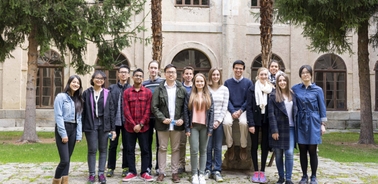- Home
- News And Events
- News
- Young People From Fifteen Countries Form This Year’s Ie University Junior Advisory Board
Young people from fifteen countries form this year’s IE University Junior Advisory Board

Young people from fifteen countries are meeting from April 11 to 15 at IE University’s Segovia and Madrid centers for the eighth edition of the Junior Advisory Board. The Board is comprised of pre-university students who have been selected by IE University from over 300 candidates from fifty countries for their extraordinary profiles, their academic merits, and their mastery of different disciplines. The talent-based advisory board’s objective is to build a snapshot of these young people’s current vision of the academic world and consider possible improvements in the field of university education.
This year’s Board comprises young talents, with nineteen nationalities between them, based in fifteen countries - China, Vietnam, UAE, Jordan, Mexico, Peru, Ecuador, El Salvador, the United States, Canada, Slovenia, France, Finland, Germany and Spain. For the selection process IE University enjoyed the collaboration of its extensive network of international offices located around the world, which provided the necessary reach to bring this opportunity to the largest possible number of colleges worldwide. After an exhaustive analysis of the candidates, the organizers of the Advisory Board selected fifteen young people with extraordinary profiles and who shared a commitment to excellence, innovation, human values and ethics.
During their stay in Spain, the students will take part in a series of workshops and classes focused on a range of subjects related to politics, education and entrepreneurship, led by experts in the corporate world and IE University professors. They will also be involved in several cultural activities run in both Segovia and Madrid where they will experience Spanish culture.
To round off this intensive week, students will present to IE University’s board of directors new ideas and proposals related to university education, based on the knowledge acquired during the week and on their own personal experience. This presentation will be taken into consideration when it comes to designing academic programs adapted to the needs of new generations and the way in which they view the world.